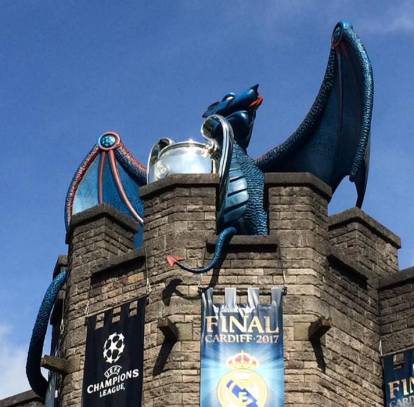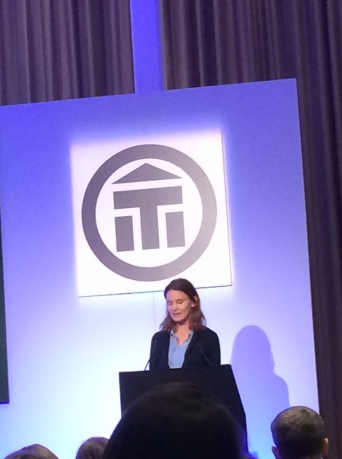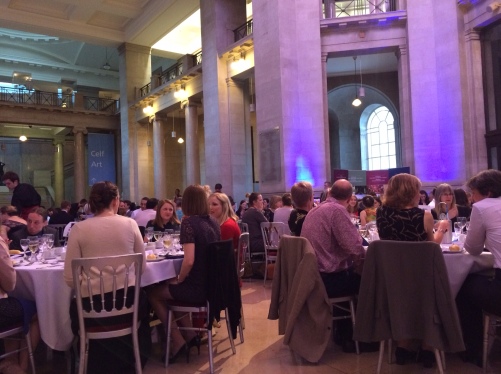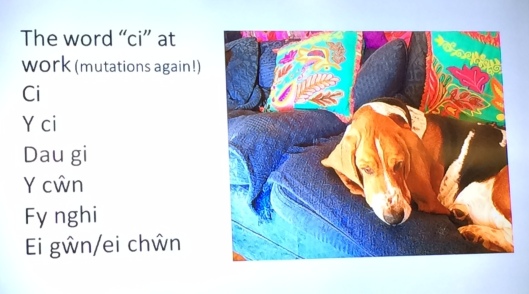Tags
Cardiff, Collaboration, Collaborative approach, Colleagues, Conferences, Core skills, CPD, Editing, ITI Conference, Networking, People, Pricing, Quality, Revision

One week on from the ITI Conference in Cardiff and my feet have barely touched the ground, yet I really do want to try and set my impressions down while they’re still relatively fresh in my mind. A resounding success, thoroughly enjoyable, thought-provoking, great fun, a social whirl, exhausting…. these are all thoughts that pop into my head. Set in the Welsh capital, this was a truly first-class event – in fact, they seem to get better every time. The city is preparing to host the Champions League final in early June, so you could say we were the international advance guard; it certainly passed our test with flying colours!
The conference theme was “Working our core – for a strong(er) translation and interpreting profession”, with the emphasis firmly on collaboration and taking a searching look at our core skills of translation/interpreting/editing. We were put through our paces, not only for the two full days of the conference proper, but also at the networking reception on the evening before the event, with a lengthy queue for welcome drinks (to test our ability to network with strangers in the line, of course!). This was followed by a speed-dating (oops, networking) game in which we had to chat to random colleagues for a couple of minutes and acquire a full set of coloured stickers in the process to qualify for entry to a prize draw. Far be it from me to suggest that certain people might even have cheated by (horror!) using their own stickers, or begging them from friends…. It was a fun start to the proceedings and certainly offered us the chance to mingle with colleagues old and new.
Events started in earnest the following morning with a four-track programme, offering plenty of choice of presentations and inevitably a number of clashes too, where I’d ideally have loved to attend two sessions simultaneously. I can only comment on the sessions I attended, but the quality seemed to be very high across the board. After an inspiring welcome address by Nia Griffith MP, herself a former language teacher, my personal agenda commenced with Karen Tkaczyk’s fascinating talk about her “lucrative sideline”, describing her take on editing scientific papers by non-native English speakers. This is something many of us will have encountered in our work over the years and it was interesting to hear Karen’s account of how this differs from our bread-and-butter translation and editing jobs. Buttering up the client is one skill that definitely comes to the fore here, as you’re often dealing with the author of the text and need to soften the impact of all that red pen with carefully worded compliments here and there. Pricing can be a contentious issue too, as you may be dealing with an unknown quantity, especially if multiple authors have been involved, but a project fee based on your best estimate of the number of hours is the way to go – for all those you underestimate, there are bound to be others you overestimate.
Next up were Alison Hughes and Adriana Tortoriello, hitting the big stage for the first time with an entertaining presentation on the ins and outs of translating creative and marketing-type texts. Tips that stood out for me were Alison’s suggestion to keep a “cheat sheet” of “in” words that might possibly come up in a future translation as you come cross them in everyday life. I also liked Adriana’s idea of thinking of the personality traits embodied by your client’s core values to help distance your translation from your own voice.
Another highlight of the first day was Chris Durban’s talk on scalability. I’ve heard Chris speak at these events many times before, but she always gets straight to the point and reminds us what’s important: we all enter the profession because we’re passionate about languages, but somehow along the way we get side-tracked by the urge to grow, agency demands to use translation tools, and the need for speed and competitive rates. The fact that translation is at heart a “talent industry” gets lost underfoot, causing us to lose our USP. Yet by focusing on quality, working with editors and colleagues to produce the best possible work, and constantly seeking to improve our writing skills, it is possible to scale up our business in a different way. Food for thought indeed. One comment struck me in particular: when asked how she would respond if asked to translate in a very short deadline, Chris said that she would take a deep breath and then quote a figure four or fives time her usual rate. If the client accepted, of course, she would have to be able to come up with the goods in the given timescale, so this is a high-risk strategy. The underlying message is, and should be, that a good translator’s time is valuable.
Day One concluded with a brief round-up from ITI CEO Paul Wilson and Chair Sarah Griffin-Mason on ITI’s next steps, including some fascinating statistics. ITI had 3016 members at the end of the last membership year, of which 340 were attending the conference – and I can vouch that there were people there I would have liked to talk to, but never seemed to bump into! Of the total membership, 1669 are qualified MITIs, which displays an impressive commitment to further professional development. Paul also announced that, to supplement the biennial conference, the Board are intending to put on a new one-day event on alternate years, entitled “One Day in…” – watch this space!
My highlights of Day 2 included Kim Sanderson’s entertaining presentation on translating for the world of advertising, and Marga Burke-Lowe’s standing-room only session on revision and editing skills, which emphasised the need for revisers to work with the translator and only make changes that are strictly necessary, rather than seeking to score points – how many of us will rejoice to hear that?!

The keynote speakers on both days were excellent: Lane Greene, from The Economist, speaking eloquently about the alleged decline of English in the light of Jean-Claude Juncker’s recent comments, only to show that in reality English is gaining in importance when compared across a range of global parameters. I felt his article, published the following week, didn’t quite reflect the upbeat message of the conference, whereas his address did hit the right note – perhaps you had to be there?! Susie Dent, Countdown’s resident lexicographer, was superb in her keynote speech on Saturday, conveying perfectly her love of language with a rapid string of anecdotes and tongue-tickling words that warmed the cockles of all our hearts and reminded us precisely why we became linguists in the first place. A real joy.
Last but not least came Helen Oclee-Brown’s amusing talk on translating sporting metaphors, aptly titled “Sticky Wickets”. The final session of any conference is always a tricky spot to fill, but Helen rose to the challenge admirably as she described how Anglosaxon languages love a good sporting metaphor: often cricket in the UK, or baseball in the US. Heaven help those of our colleagues who have to translate “We’ll hit them for six” from English into their target language, as one English>French translator plaintively remarked.

Of course, the underlying point of any conference, especially for translators who often work from home, is the ability to meet face-to-face with real people. Networking opportunities abound at coffee breaks between sessions, at lunch and at the myriad events organised before, during and after the conference. Whether you meet people working in the same field who might refer you to clients (or vice versa), potential revisers/editors for your translations, or simply like-minded colleagues you can call on for terminology or technical queries, this is a profession where working entirely in isolation really doesn’t pay off.
The German Network dinner on the Thursday night was a fabulous chance to meet up with colleagues working into or out of German, and a huge success with over 40 attendees. Friday’s gala dinner at Cardiff’s National Museum was a glittering event in a prestigious setting with delicious food, the inaugural ITI awards and the opportunity to dance until the early hours and really let our hair down. Saturday saw the Foodie Translators meeting at the Potted Pig near the Castle for a very special meal in one of Cardiff’s premier foodie venues. And finally, Lloyd Bingham led some 40 or so translators on a whistlestop tour of the city on Sunday morning, taking in such venerable sights as Cardiff Castle, the green expanses of Bute Park, the beautiful civic buildings and the revitalised Cardiff Bay area with its stunning Millennium Centre.
Other delights on offer included a wonderfully relaxing, yet invigorating yoga session with Corinne Durand on Friday afternoon to recharge our batteries after a full-on day of concentrating hard, the Welsh taster session for early birds on Saturday morning (who knew Welsh was so difficult?!), and a session with Paul Filkin from SDL Trados on the Thursday afternoon, with technical whizzkids on hand throughout the conference to answer technical queries.

Endless permutations of the word “dog” in Welsh!
Huge congratulations as always to Anne de Freyman, organiser-in-chief, plus the ITI office staff and Board, for a meticulously planned and extremely successful conference. The venue was perfect, food was delicious (huge improvement on Newcastle!) and the whole thing flowed from beginning to end. Even the weather was perfect! Looking forward to the next one already – but only when I’ve come back down to earth 🙂




Very comprehensive review Claire and sorry I didn’t get to meet you in person. Next time hopefully!
Thanks, Jason – I think I kept seeing you across the other side of the room! So hard to find time to meet everyone you’d like to – definitely next time 🙂
Wonderful review of this conference! It makes me want to become an ITI member (at a certain point I wanted to go through the selection process, but I gradually lost interest due to the huge workload and to other conferences which clearly distracted me). After some events you genuinely feel like the content is not really worth it. Good thing the networking makes up for it.
I do recommend it, Annamaria. You can just become an associate member in the first instance if you can’t face the exams straightaway. I’ve certainly found it well worthwhile, and not only for the excellent conferences. The various language networks are all a useful source of networking and terminology help/support too.
Pingback: Weekly translation favorites (May 19-June 1)
An excellent review of a thoroughly enjoyable event – thank you, Claire! You seem to have chosen mostly different sessions from those I attended, so it’s interesting to hear what was happening elsewhere.
Thanks Laura. I’m looking forward to hearing other people’s views as there were some clashes where I would have loved to attend other sessions. I heard excellent things about Stephen Powley’s talk on the nuts and bolts of specialising, for example.
Pingback: One Day in London… | ClaireCoxTranslations
Pingback: A decade in retrospective | ClaireCoxTranslations